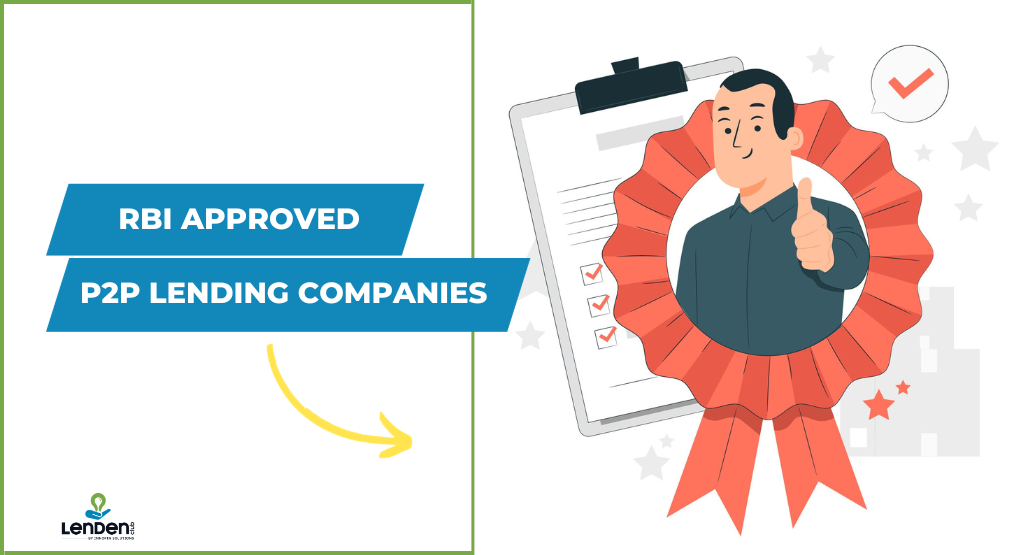RBI Approved P2P Lending Companies

RBI-Regulated P2P Lending Platforms
First and foremost is transparency. RBI regulations require platforms to maintain clear records of all transactions, so that both lenders and borrowers have a complete understanding of the terms and conditions of their agreements.
Additionally, most of these platforms are also answerable to RBI that forces them to have periodic reporting of data and activities carried out on these platforms. Again, that kind of vigilance prevents unethical practices and helps fraud prevention within the user base.
1. LenDenClub
LenDenClub is India’s largest Peer-to-Peer lending platform in India. The company boasts transparency and reliability on its back and has itself emerged as the first P2P lending destination of choice for lenders as well as borrowers with 15,000 crore plus amount lent and more than 2 crore plus customers. Strong due diligence processes form the backbone of ensuring the trust offered by borrowers to the lenders. The platform offers competitive interest rates, and one can attract more lenders who seek higher returns.
Start your lending now: Link
2. Faircent
Another significant entity in the Indian P2P lending market is Faircent. It essentially connects borrowers and lenders with ease due to a great user interface and strong credit assessment tools. It enables full risk-profiling of borrowers along all dimensions, which would help lenders in taking informed decisions. Also, detailed loan reports for lenders are delivered on the platform, hence allowing for trackability of investments and returns.
3. i2iFunding
What differs i2iFunding from the other P2P lending platforms is a strong focus on lenders for security. It would be great to note that there exists a loan guarantee program initiated by the platform, which reduces lenders’ risks as they receive compensation in case of borrower default. Other diversified loan options ranging from short-term to long-term loans further make the lender use this platform more often than others.
4. Finzy
Finzy has built a reputation for offering quick loans with easy process to borrowers while providing steady returns for lenders. The platform’s simple processes make it a favorite among both novice and experienced investors. Finzy also stands out for its customer service, ensuring that any issues or queries are addressed promptly.
It allows you to customize your cash flows using handy tools on the dashboard. You can select your interest rates, commitment period, and other aspects to generate the desired cash flow.
The platform also has handpicked borrowers with a low possibility of risk or default, enabling safer investments for the lenders.
5. India P2P
On this platform, borrowers can easily apply for loans with less documentation. India P2P provides advanced security measures for safe and secure transactions. It provides multiple lending options for the lenders, thus providing a wide range of loans.
Peer-to-peer (P2P) lending is transforming the financial landscape in India, offering an alternative to traditional banking systems for both borrowers and lenders.
So what exactly does the P2P lending platform do?
Essentially, it connects loan borrowers with the lenders who want to lend their money, completely bypassing the usual banking structure. P2P lending gained popularity, especially promising lenders higher returns and easy access to credit for borrowers.
With every new financial innovation comes the imperative to have an all-encompassing regulatory framework. In August 2024, RBI made a move to put regulation on the P2P lending sector ensuring that these platforms operate transparently and securely.
This article will explain what it means for a P2P platform to be RBI-regulated, the implications that come with this and will also profile some of the most prominent RBI-regulated P2P lending platforms in India.
What Does RBI Approval Mean for P2P Lending?
RBI approval for P2P lending platforms ensures they operate with strict compliance and transparency. All the transactions will be passed on through secured bank-managed escrow accounts, thereby reducing the chance of fraud. The RBI further asks the platform to disclose their loan performance and risks involved by a borrower so that lenders can make informed decisions. The RBI further limits the sum an individual can invest, and he will have better risk management.
How RBI Approval Enhances the Safety of P2P Lending
Acquiring RBI approval will dramatically add to the safety of P2P lending platforms since they are very stringent in imposing rules and regulations. These platforms must comply with rules that promote transparency, ensure secure fund transfers through bank-managed escrow accounts, and prohibit offering credit guarantees. Disclosures of risks of borrowers and loan performance are also made periodically to the lenders in accordance with the requirements imposed by the RBI. This minimizes the overexposure and fully informs a lender of potential risks by capping the amount a lender can invest and mandating risk declarations. All this makes P2P lending safer for all parties involved.
Conclusion
In conclusion, RBI-approved P2P lending platforms are changing the way Indians approach borrowing and investing. By ensuring transparency, accountability, and safety, these platforms offer a secure environment for both lenders and borrowers. Whether you’re looking to earn higher returns or seeking an easy loan, exploring RBI-regulated P2P platforms is a smart choice. As the sector continues to grow, more individuals will benefit from this innovative financial model.
Team LenDenClub
LenDenClub is India’s largest alternate investment platform which started operations in India in 2015. We have been helping investors diversify their investments beyond traditional investment instruments ever since.